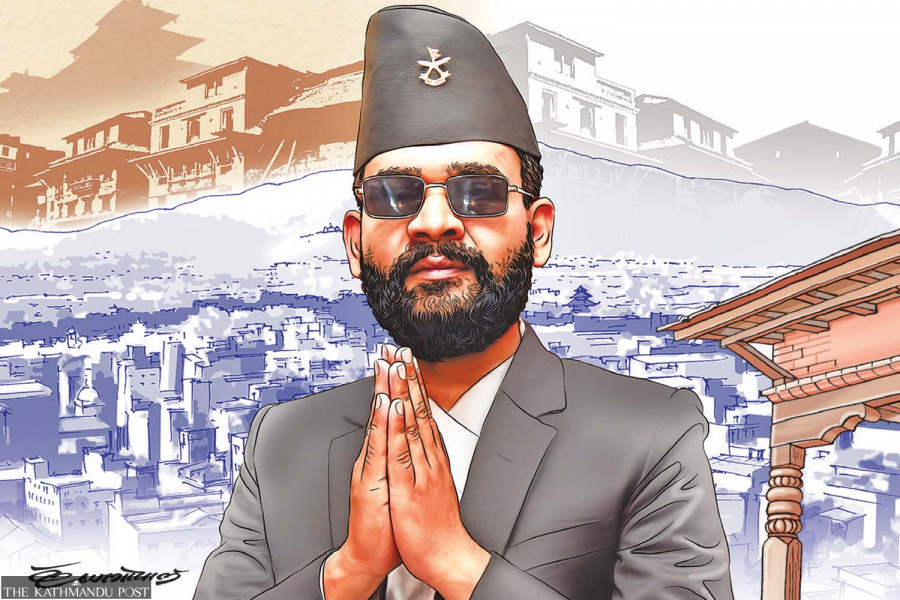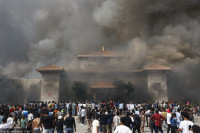Kathmandu
City may resume garbage removal from Singha Durbar
Kathmandu Metropolitan City officials say they are waiting for the Supreme Court’s Friday order to arrive.
Post Report
After the Supreme Court on Friday issued an interim order against the Kathmandu Metropolitan City to immediately remove uncollected garbage from Singh Durbar and two other VIP addresses, the City is waiting for a copy of the court order before it could resume garbage removal.
Accusing the government and top officials of not heeding the KMC’s pressing concerns, Mayor Balendra Shah had stopped collecting garbage from the government’s central secretariat Singha Durbar and the official residences of the prime minister and the President since April 9. Mayor Shah announced his decision on social media saying his move was a protest against the “neglect, lack of responsibility and carelessness shown by the federal government” to KMC’s concerns.
“We have not received the court’s letter yet,” said KMC spokesman Nabin Man Manandhar. The court had ordered the KMC to resume garbage collecting within three days.
“After receiving the letter, we will have three days to resume garbage collection, so we will decide accordingly,” he said, indicating that they will soon remove the garbage, which has been piling for the past 16 days.
Friday’s interim decision was issued by a single bench of justice Prakashman Singh Raut.
The KMC may remove the uncollected garbage, but another problem is brewing at the Banchare Danda landfill site in Nuwakot district.
Last week, the Dhunibesi Municipality of Dhading and Kakani Rural Municipality of Nuwakot that are affected by garbage transportation and landfill, respectively, issued a joint statement threatening to bar garbage trucks if the KMC and authorities do not implement the agreement reached with them on June 6, 2022. In the statement, the local units have given the KMC 15 days to make good on the agreement.
When the Post contacted Rabin Man Manandhar, the head of the municipal Environment Department, to inquire about the issue, he said the mayor and the chief administrative officer will decide how to move ahead.
“The KMC’s first priority will be to abide by the court order, and then we will hold talks with the two local units to address their grievances,” said Manandhar.
Based on last year’s agreement with the landfill-affected local units, the ministry had allocated Rs17 million in the current fiscal year for embanking a local river and for planting trees. But the work has not started, according to locals.
The ministry had also announced plans to buy the lands of the locals of the affected area but local representatives say nothing has been implemented to date.
In April last year, the KMC had reached a separate agreement with local authorities to make Sisdole and Banchare Danda smell-free zones. The City had announced plans for a scientific study of the most affected areas in Sisdole and Banchare Danda.
Some other points mentioned in the agreement included improving the quality of education at local schools, launching a programme to help locals in agriculture, and conducting an environmental impact assessment (EIA).
In his conversation with the Post last week, Balkrishna Acharya, the mayor of Dhunibesi Municipality, had said he had not received any EIA report and all those promises were limited to paper.
Kathmandu Valley generates 1,200 tonnes of solid waste a day. Nearly 60 percent of it is produced within the Kathmandu Metropolitan City. Experts say over 60 percent of the organic waste originating in the Valley can be converted into compost manure. Up to 30 percent of the non-biodegradable waste can be sold to recyclers.
Although waste management is an old problem in Kathmandu, this seems to be the first time the metropolis decided not to collect garbage from the country’s administrative hub and other VIP addresses to press for an effective solution to the waste problem. The City has accused the federal government of not cooperating in the former’s effort to remove squatter settlements from Kathmandu’s riverbanks.




 17.12°C Kathmandu
17.12°C Kathmandu









